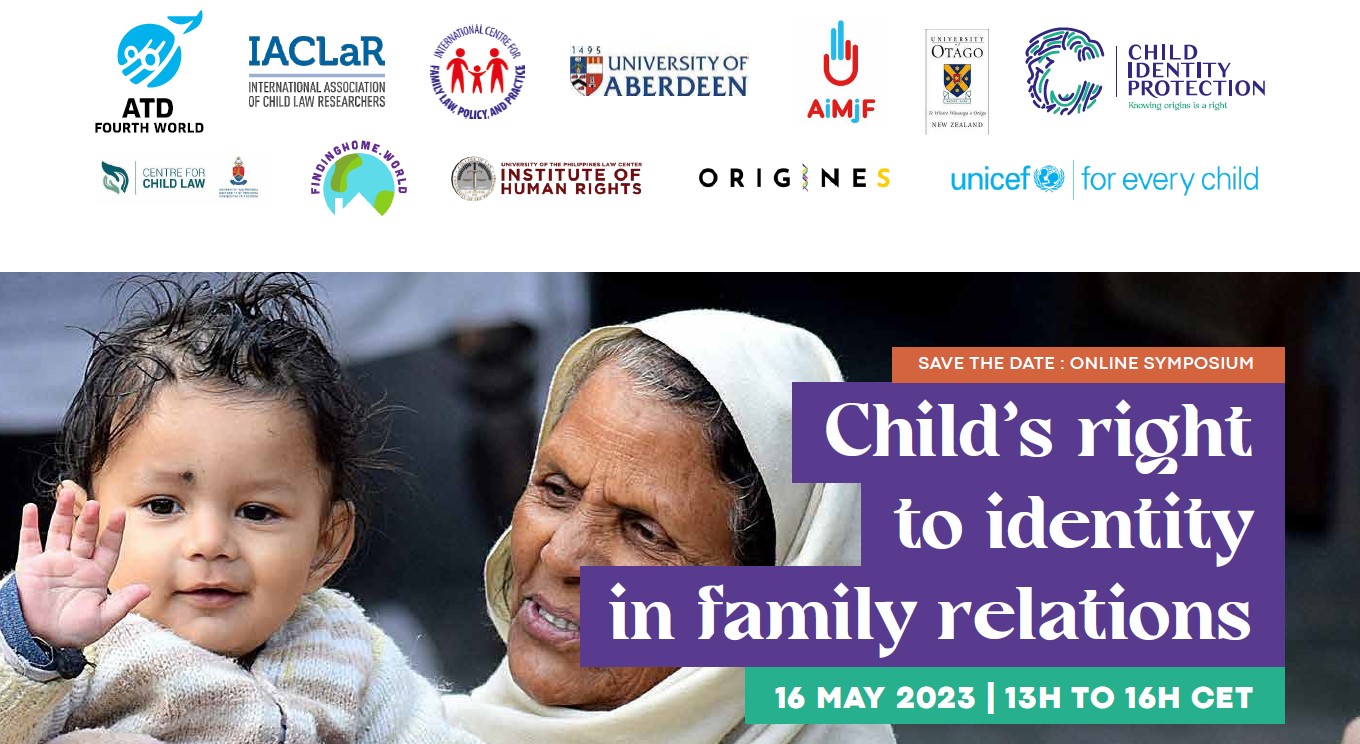
Simposio virtual – El derecho de los niños y niñas a la identidad en las relaciones familiares
OVERVIEW
Video Recording
Presentations
- Child’s right to identity and family relations, Professor Velina Todorova – CRC Committee member
- Stolen identities – The devastating impact social work services has on the identity of children living in poverty in the UK, Aurelia, Kaydence and Tiegan, ATD Fourth World and Teen Advocacy
- Supporting families and preventing unnecessary separation, Aniruddha Kulkarni – UNICEF
- Preserving the child’s identity in cross-border family matters – perspectives from HCCH, Philippe Lortie/Laura Martinez-Mora
- Preserving “family relations”: an essential feature of the child’s right to identity, Christina Baglietto – Child Identity Protection
- Identity and child participation rights in family law proceedings – Professor Marilyn Freeman, International Centre for Family Law, Policy and Practice and University of Westminster and Professor Nicola Taylor – University of Otago
- Child identity in the context of parental child abduction, Dr Katarina Trimmings – University of Aberdeen
- Donor conceived persons perspectives, Audrey and Arthur Kermalvezen – Association Origines
- Child’s right to identity in family relations from an Asia Pacific perspective, Professor Elizabeth Pangalangan -University of Philippines
- Child’s right to identity in family relations from an African perspective, Karabo Ozah, Centre for Child Law – University of Pretoria
- Child’s right to identity in family relations from a European perspective, Olga Khazova, former CRC Committee member and Child Identity Protection advisor
- Child’s right to identity in family relations from a Latin Americas perspective, Eduardo Rezende Melo – International Association of Youth and Family Judges and Magistrates
- Highlighting Themes for Children with Significant Identity Issues – Sharon Pettle and Roni Pea
APUNTE LA FECHA: 16 DE MAYO DE 2023 | 13.00 – 16.00 CET
La familia ha sido aceptada de forma unánime como el fundamento de la sociedad, al procurar “el crecimiento y el bienestar de todos sus miembros, y en particular de los niños”, y teniendo “derecho a la protección de la sociedad y del Estado” (art. 16.3 de la Declaración Universal de Derechos Humanos; Preámbulo de la Convención sobre los Derechos del Niño).
En el marco de los eventos marcando el Día Internacional de las Familias –conmemorado el 15 de mayo de cada año desde la resolución de la Asamblea General de la ONU en 1993–, Child Identity Protection (CHIP), con sus aliados, está organizando un simposio virtual sobre la importancia de la identidad familiar de los niños y niñas. El evento se fundamenta en las iniciativas promoviendo el registro de nacimientos y la nacionalidad, al enfocarse en las relaciones familiares –un elemento crucial de la identidad de los niños y niñas–. Este simposio se suma a los esfuerzos en el marco de la ONU y de los mecanismos regionales dedicados a la preservación y al restablecimiento de la identidad de cada niño o niña, de conformidad con los artículos 7 y 8 de la Convención sobre los Derechos del Niño y los Objetivos de Desarrollo Sostenible 16.3 y 16.9.
A pesar de dichas normas e iniciativas internacionales, millones de niños y niñas han sido o están siendo separados innecesariamente de sus familias. El curso natural de la interacción entre progenitores y niños o niñas puede verse interrumpido, por ejemplo cuando son abandonados, acogidos en modalidades alternativas de cuidado, adoptados, nacidos mediante la gestación subrogada, vendidos y/o víctimas de trata, desplazados o en situaciones de movilidad humana, conflicto o desastre natural. Además, los sistemas pueden haber sido diseñados para ocultar informaciones sobre los orígenes del niño o niña, entre ellas su posible familia. Estas situaciones pueden conllevar una privación de la identidad en las relaciones familiares, con implicaciones significativas desde la perspectiva jurídica, psicosocial y médica. La pérdida de identidad también puede generar obstáculos al acceso de los niños y niñas a otros derechos, como la educación, la salud, los derechos económicos, sociales y culturales.
Este simposio explorará el derecho al establecimiento o al reconocimiento de las relaciones familiares, como un derecho autónomo. Esto es significativo, puesto que cada persona tiene una historia familiar –genética, gestacional, social y jurídica– que contribuye a su identidad y a sus orígenes. También abordará los mecanismos que deberían existir para preservar mejor todos los elementos de la identidad familiar y su restablecimiento cuando aparezcan vacíos, incluida la falsificación.
- Our speakers will speak slowly- if too fast, please let us know by sending a comment in the Zoom Q&A
- The session is being recorded
- On safeguarding and etiquette:
- Participants may rename themselves and use alias instead
- Please always be respectful when speaking and giving comments or questions and please note that any questions that are abusive will be removed
HORARIO
Moderator : Mia Dambach (Child Identity Protection, Executive Director)
Speakers coming from all regions with multi-disciplinary backgrounds focusing on a range of issues include :
- Child’s right to identity and family relations, Professor Velina Todorova – CRC Committee member
- Stolen identities – The devastating impact social work services has on the identity of children living in poverty in the UK, Aurelia, Kaydence and Tiegan, ATD Fourth World and Teen Advocacy
- Supporting families and preventing unnecessary separation, Aniruddha Kulkarni – UNICEF
- Preserving the child’s identity in cross-border family matters – perspectives from HCCH, Philippe Lortie/Laura Martinez-Mora
- Preserving “family relations”: an essential feature of the child’s right to identity, Christina Baglietto – Child Identity Protection
- Identity and child participation rights in family law proceedings – Professor Marilyn Freeman, International Centre for Family Law, Policy and Practice and University of Westminster and Professor Nicola Taylor – University of Otago
- Child identity in the context of parental child abduction, Dr Katarina Trimmings – University of Aberdeen
- Donor conceived persons perspectives, Audrey and Arthur Kermalvezen – Association Origines
- Child’s right to identity in family relations from an Asia Pacific perspective, Professor Elizabeth Pangalangan -University of Philippines
- Child’s right to identity in family relations from an African perspective, Karabo Ozah, Centre for Child Law – University of Pretoria
- Child’s right to identity in family relations from a European perspective, Olga Khazova, former CRC Committee member and Child Identity Protection advisor
- Child’s right to identity in family relations from a Latin Americas perspective, Eduardo Rezende Melo – International Association of Youth and Family Judges and Magistrates
INTERVENTORES

Christina Baglietto
Speaker
Has over 15 years of experience in alternative care and adoption. She has experience working in the context of legislative, political, institutional and practical reform in these areas. In Guatemala, she contributed to the implementation of new national legislation on adoption and alternative care and international standards, provided training, and developed standard operating procedures. Likewise, she has provided training and technical support in the reforms of these systems across the globe. In the last decade, she has been a consultant for various UNICEF offices, International Social Service, the Hague Conference on Private International Law, as well as the Latin American Foster Care Network.

Laura Martínez-Mora
Speaker
Works as a Secretary (Lawyer) at the Permanent Bureau of the Hague Conference on Private International Law (HCCH). She is responsible for the post-Convention work in relation to the HCCH 1993 Convention on Child Protection and Cooperation in Respect of Intercountry Adoption, as well as the Parentage / Surrogacy project. Laura has also worked on children’s issues at the International Social Service (Switzerland); UNICEF (Chile); the European Commission (Belgium) and the Council of Europe (France). She received her law degree from the University of Valencia (Spain), a Master of Laws (LL.M) in International Law with a specialisation in child’s rights (University of London, UK), and a Diploma in Child Protection and Juvenile Justice (University Diego Portales, Chile).

Olga Khazova
Speaker
Prof. Olga Khazova, member of the UN CRC Committee (2013-2021), is currently affiliated with the Moscow School of Social & Economic Sciences and the National Research University “Higher School of Economics” (Moscow). Until 2018, for more than 30 years, Olga had been working at the Institute of State & Law within Russian Academy of Sciences. She holds Ph.D. from that Institute and LL.M. from Cornell University Law School (USA). The main field of her expertise is connected with international family law and child law. Apart from teaching, Olga serves as a consultant on matters related to children’s rights and family law, including human reproduction issues. Olga is the author of Marriage and Divorce in Western Family Law, as well as of numerous scholarly articles published in Russia and abroad. She is a Vice-President of the International Society of Family Law (ISFL).

Mia Dambach
Moderator
Is a human rights advocate with 20 years’ experience of working on children’s rights, starting her career as a children’s lawyer in Australia. As the Executive Director she brings with her leadership, project management and research skills to ensure that children’s identity rights are better protected worldwide. She has provided technical support, mostly on behalf of UNICEF, through evaluation missions in over 20 countries focusing on alternative care, adoption, and surrogacy. With many years of further experience and a family background from Australia, the Philippines, and Switzerland, she understands the importance of children having access to their origins.
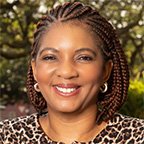
Ronaldah Lerato Karabo Ozah
Speaker
Karabo Ozah is the Director at the Centre for Child and a Lecturer in the Department of Private Law of the University of Pretoria in South Africa. The Centre for Child Law is an organisation that protects and promotes children’s rights through research, advocacy and strategic litigation. Karabo has contributed to the work of the Centre, including litigation successes in the Constitutional Court, the Supreme Court of Appeal and the High Courts. Karabo holds an LLB; a Certificate in Advanced Labour Law; LLM in Child Law (cum laude) and LLM (Constitutional and Administrative Law) from the University of Pretoria. She serves on the Advisory Committee of the South African Law Reform Commission’s Project 100D on Care of and Contact with Children (incorporating Family Dispute Resolution). Karabo is also a member of the Hague Expert Group on International Parentage and Surrogacy that is tasked with researching the possibility of a Hague treaty to regulate international parentage and surrogacy. Recently, Karabo chaired the Special Commission of the Hague Conference on Private International Law focusing on Inter-country Adoptions in 2022.
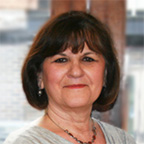
Marilyn Freeman
Speaker
Marilyn is Co-Director of the International Centre for Family Law, Policy and Practice (ICFLPP), Principal Research Fellow at The Westminster Law School, London, and chairperson of the International Association of Child Law Researchers (IACLaR). She is widely acknowledged as a leading expert in the area of international child abduction and international children’s law, and publishes widely in her areas of expertise. Her current research focuses on the issue of Identity for Children and Young People; Domestic Violence and International Child Abduction; and Child-Friendly Resources relating to International Child Abduction. She holds a door tenancy at 4PB, a specialist Family Law set of barristers’ chambers in London, and qualified as a Family Mediator, trained to undertake direct consultation with children, cases involving international child abduction, and other international family disputes.

Nicola Taylor
Speaker
Nicola specialises in child and family law in the Faculty of Law at the University of Otago in New Zealand. She is the Director of the Children’s Issues Centre, has been admitted as a Barrister and Solicitor of the High Court of New Zealand, and is a qualified mediator. She is Secretary of the International Association of Child Law Researchers (IACLaR). Nicola is a leading socio-legal researcher and has undertaken many studies with children, parents and professionals on family law and children’s rights issues including post-separation care arrangements, relocation, international child abduction, children’s views and participation, family dispute resolution, relationship property division and succession law. Her research findings have been invaluable in informing legislative, legal policy and professional practice developments within New Zealand and internationally.
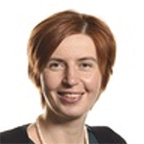
Katarina Trimmings
Speaker
Dr Katarina Trimmings is a Senior Lecturer in Law at the University of Aberdeen and the Director of the Aberdeen Centre for Private International Law. Her research interests fall within the area of Private International Law of Family Law, in particular international parental child abduction and the interface between Private International Law and Assisted Reproductive Technologies. She has published extensively on the topics of parental child abduction and cross-border surrogacy and is one of the authors of the 15th edition of Cheshire’s Private International Law (Oxford University Press, 2017).
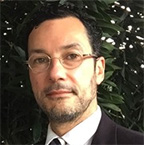
Eduardo Rezende Melo
Speaker
Eduardo Rezende Melo is a Judge in Brazil, he holds a PhD in human rights (University of São Paulo), a master in philosophy (PUC-SP) and in children´s rights (University of Fribourg, Switzerland). He is the pedagogical coordinator on children´s rights of the São Paulo State School for Magistrates. He´s currently involved in a post-PhD study in Social Sciences (UNINOVA Lisbon, Portugal). He is also Editor in Chief of the Chronicle, the International Association of Youth and Family Judges and Magistrates (AIMJF)´s Journal, coordinating researches and organizing webinars on the Justices system and children´s rights.

Arthur Kermalvezen
Speaker
- Conçu grâce à un don de gamètes, ce qu’il a toujours su.
- Fondateur et président de l’association ORIGINES.
- Auteur d’un livre de témoignage “Né de spermatozoïde inconnu”, sous le nom d’Arthur Kermalvezen, préface de Serge Tisseron, éd. Presse de la Renaissance 2008 et éd. J’ai lu, 2010.
- Porte-parole depuis 2006 des personnes conçues par don de gamètes.
Premier français à avoir retrouvé le donneur à l’origine de sa conception grâce à un test ADN récréatif en septembre 2017

Audrey Kermalvezen
Speaker
- Conçue grâce à un don de gamètes, ce qu’elle a appris à l’âge de 29 ans.
- Fondatrice et membre de l’association ORIGINES.
- Avocate de formation, spécialisée en droit de la bioéthique.
- Auteure d’un essai-document “Mes origines : une affaire d’État”, sous le nom d’Audrey Kermalvezen, préface du professeur Israël Nisand, éd. Max Milo, 2014.
Première personne conçue par don de gamètes à avoir saisi la justice en 2010 pour accéder à ses origines personnelles. Après avoir été déboutée en 2015 par le Conseil d’État, elle a saisi la Cour européenne des droits de l’homme. Sa requête est actuellement en cours d’examen.
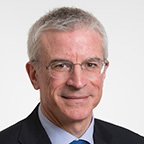
Philippe Lortie
Speaker
Philippe Lortie joined the Permanent Bureau of the HCCH in September 2001 as First Secretary. He is co-responsible for the International Child & Family Law Division. In addition to the HCCH 1961 Form of Wills, 1970 Divorce, 1980 Child Abduction and 1996 Child Protection Conventions, for which he is co-responsible, Philippe Lortie is solely responsible for the HCCH 2000 Protection of Adults and 2007 Child Support Conventions and the 2007 Protocol on the Law Applicable to Maintenance Obligations. He also has overall responsibility for the International Hague Network of Judges including Direct Judicial Communications, the Judges’ Newsletter and e-Justice tools supporting Hague Conventions such as e-Country Profiles, INCADAT and iSupport.
Before joining the HCCH, from 1991 to 2001 Philippe Lortie was Legal Counsel at the Department of Justice of Canada. In that capacity, he acted as Head of Canadian delegations to the HCCH, Unidroit and UNCITRAL. Philippe Lortie is a member of the Québec Bar since 1991 and holds degrees in Civil Law (LL.L.) and Common Law (LL.B.), both from the University of Ottawa. He also holds a Master’s degree (LL.M.) in international law from the same university for which he received (ex aequo) the Canadian Council on International Law Sylvie Gravel Prize for best Master’s thesis in international law in Canada. Finally, he holds a degree in Business Administration (B.A.A.) from the École des Hautes Études Commerciales (HEC) de Montréal.

Aurelia
Speaker
Aurelia is 17, home educated and the second of nine. She is a co-founder of Teen Advocacy. More recently, she has been involved as a peer researcher as part of a Youth Voices project with ATD in submitting evidence to the UN about human rights violation in the UK.

Kaydence
Speaker
Kaydence is 18, home educated and the eldest of nine. She is a Youth Ambassador for the End Child Poverty Coallition and co-founder of Teen Advocacy. She was also a peer researcher for our submission to the UN.
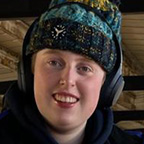
Tiegan
Speaker
Tiegan is a 21 year adoptee who is in her second year of university. She is a Youth Ambassador for the End Child Poverty Coallition and does various advocacy work around her experiences of adoption. She was also a peer researcher in gathering data to support our submission to the UN.
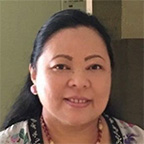
Elizabeth Pangalangan
Speaker
Professor Elizabeth Aguiling-Pangalangan is a Full Professor at the University of the Philippines(UP) College of Law and is the Director of the UP Law Center Institute of Human Rights. She holds the Professorial Chair Holder, Roberto A. Sabido Professorial Chair in Law and Development at the UP College of Law as well as a Professorial Chair on Liberty and Prosperity from the Foundation of Liberty and Prosperity where she recently delivered a lectured entitled “When Law and Technology Unbundles Traditional Identities (Adoption and Surrogacy).
She earned her undergraduate and law degrees from UP and her LL.M. from Harvard Law School (HLS). She was appointed as Visiting Scholar and later, Research Fellow in the East Asia Legal Studies Program of the HLS. She attended The Hague Academy of International Law on a scholarship and subsequently lectured in its External Programme. She was likewise a Packard –Gates Fellow in University of California Sta. Cruz where she received the Gender Equity Award.
She was a visiting lecturer at Leiden University Law School, The Netherlands teaching in the Advanced Masterclass in International Human Rights Law and the Frontiers of Children’s Rights Summer School in 2019.
Prof. Aguiling-Pangalangan was Amicus curiae appointed by the Philippine Supreme Court in Aquino v. Aquino on the successional rights of non-marital children (2019) and was Counsel in Imbong v. Executive Secretary, representing Former Department of Health Secretaries in defense of the constitutionality of the Reproductive Health Law (2014). Her expertise was recognized by the Philippine Department of Social Welfare and Development which asked her to draft the Philippine State Periodic Report to the UN Committee on the Rights of the Child, 2017-2018 and engaged her services for the Assessment of Alternative Parental Care Programs in the Philippines that led to the enacted of a new law on Alternative Child care in 2022, and by the Department of Justice (DOJ) where she led the drafting of the DOJ handbook “Protecting Filipino Children from Abuse, Exploitation and Violence: A Comprehensive Program on Child Protection” in 2019..
She was s a member of the HCCH Experts’ Group on Parentage and Surrogacy for six years and was designated Philippine expert to HCCH working groups on various Hague child protection conventions and special commissions.
She is the President of the Philippine Society of International Law, member of the Executive Council of the Asian Society of International Law and Editorial Board member of the Philippine Yearbook of International Law. She has written extensively on private international law, children’s rights, reproductive rights, and Family law which have been published by the University of the Philippines, Cambridge University Press, Kluwer International and Routledge, among others.
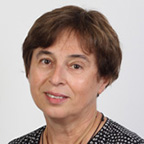
Velina Todorova
Speaker
Velina Todorova is a Bulgarian lawyer (1981) and Ph.D. in Sociology of Law (1989), Associate Professor on Civil and Family Law at the Law Faculty, Plovdiv University and Bulgarian Academy of Sciences. She has an extensive experience in research and in law making in the areas of child rights protection, social protection and family law (1997 to date). Publishes nationally and internationally and is both expert (2001) and a member (2014-2019) to the Commission on the European Family Law. Member to the European Family Law Academic Network (FLEUR) since 2019. A founder of the Governmental Agency for Child Protection (2001). She has always combined her academic career with a strong activism as a member and supporter of various human rights initiatives and NGOs. A Deputy Minister of Justice (2011-13). Member to the UN Committee on the Rights of the Child (2017-2021, 2021-2025).
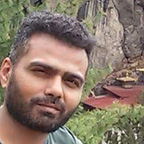
Aniruddha Kulkarni
Speaker
As a Child Protection Specialist at the Programme Division, UNICEF Headquarters, New York, Aniruddha Kulkarni contributes to international policy and programme development on child protection systems, social service workforce for child protection, care reform, child labour, and coordinates UNICEF’s protection work for . Aniruddha also works closely with and supports UNICEF’s Regional Offices and Country Offices to set and implement the child protection agenda in these workstreams. Prior to joining the Headquarters in 2018, Aniruddha worked with UNICEF in Bhutan and India for over 11 years. Aniruddha has also worked for over four years as a researcher on child protection with the College of Social Work at the University of Mumbai, where he also graduated with a master’s degree in social work in 2002.
- 16 mayo 2023





